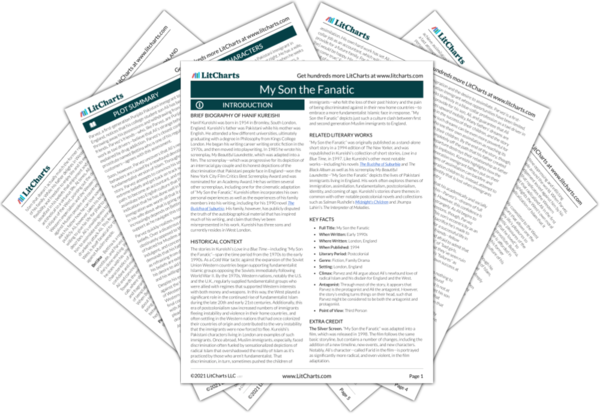Parvez, a first-generation Punjabi Pakistani immigrant to England, notices that his college-student son Ali has begun throwing away his possessions and withdrawing from his friends. Parvez’s friends—who, like Parvez, are Punjabi and work as taxi drivers—believe that Ali’s strange behaviors can be explained by drug addiction. Parvez’s closest confidant—a prostitute named Bettina who is one of his regular customers—agrees with this assessment.
Soon, however, Parvez uncovers that Ali’s new and bizarre behaviors are caused by a newfound devotion to a radical and fundamentalist version of Islam. Throughout the rest of the story, Parvez attempts to convince his son to abandon his extreme beliefs and get back on track with his previous life path: to become an accountant, and more generally to assimilate into English culture that Parvez sees as the final indication that he has done well in England, and that immigration was worth all that it cost. Parvez does not confide in his wife about what is going on with Ali, but instead increasingly depends on Bettina for advice and emotional support as he navigate this conflict with his son.

Parvez quickly realizes, however, that Ali is steadfast in his beliefs. Over a disastrous dinner, it becomes clear that Ali is obstinately opposed to Western culture, which he views as full of hatred for Muslims and shallow, materialistic, shamefully indulgent, and concerned only with the pursuit of pleasure. Ali demands that his father abide by basic rules of the Koran, such as refraining from drinking, gambling, and eating pork. It’s clear his beliefs are extreme, however, when he tells his father about his desire to aid in bringing the “Law of Islam” to rule the world, and his willingness to give up his life for the cause of jihad.
Despite his extreme beliefs, Ali at times levels valid critiques against the West. For example, he points to the negative effects of Western imperialism, white supremacy, and the violence that Western nations inflict upon Muslim countries and people. In a final conversation between the two, Parvez attempts to reason with Ali by expressing his personal philosophy of the world, and pleading that the only way for his legacy to live on after his death is through Ali and his success. Ali remains unmoved.
At the end of the story a heated confrontation between Bettina and Ali—in which Bettina tries to reason with Ali on behalf of Parvez and Ali insults Bettina for being a prostitute—sends Parvez over the edge. Enraged, he physically attacks Ali, although he knows that even this final, desperate act will not bring his son back from the brink of his extremist beliefs. As he is bloodied while passively enduring his father’s frenzied attack, Ali asks Parvez who is the fanatic now.







